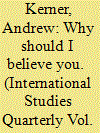| Srl | Item |
| 1 |
ID:
099105


|
|
|
|
|
| Publication |
2010.
|
| Summary/Abstract |
Why do some countries protect minority shareholders from rent-seeking by corporate insiders while others do not? To the extent that there has been convergence toward shareholder-friendly laws, what factors have shaped that convergence? We explore this question by examining the worldwide diffusion of insider trading laws through a series of event history analyses. We argue that variation in the adoption and enforcement in insider trading laws can be best explained by the interaction of rising international competitive pressures to attract investment capital through investor-friendly laws and electoral laws that make governments more or less vulnerable to economic voting. We find that governments are more likely to adopt and enforce insider trading laws when they face reelection under electoral laws that make them relatively vulnerable to economic voting and when they face international competitive pressures. Moreover, we find that the impact of domestic political institutions declines in significance as international competitive pressures increase, and vice-versa.
|
|
|
|
|
|
|
|
|
|
|
|
|
|
|
|
| 2 |
ID:
149131


|
|
|
|
|
| Summary/Abstract |
Why and when do developing countries file trade disputes at the World Trade Organization (WTO)? Although financial conditions have long been considered an important driver of trade policy, they have been largely absent from the literature on trade disputes. We argue that developing country governments bring more trade dispute to the WTO when overvalued real exchange rates put exporters at a competitive disadvantage. This dynamic is most prevalent in countries where large foreign currency debt burdens discourage nominal currency devaluations that would otherwise serve exporters’ interests. Our findings provide an explanation for differences in dispute participation rates among developing countries, and also suggest a new link between exchange rate regimes and trade policy.
|
|
|
|
|
|
|
|
|
|
|
|
|
|
|
|
| 3 |
ID:
136614


|
|
|
|
|
| Summary/Abstract |
This paper argues that the foreign direct investment (FDI) data commonly used to test political science theories about FDI often diverge from the theorized about phenomena in ways that can introduce bias and complicate hypothesis testing. I describe some of the key conceptual issues surrounding the quantification of FDI, how commonly used data deals with these issues, and the extent to which those coding rules allow or prevent these data from speaking to political science theories. I show that the empirical relationship between democracy, political risk, and multinational corporations behavior is significantly impacted by “getting the measure right.” I conclude by arguing that political science theories about FDI speak to such a wide variety of empirically and conceptually distinct phenomena that conflating them as “FDI” does a disservice to the complexity of the topic.
|
|
|
|
|
|
|
|
|
|
|
|
|
|
|
|
| 4 |
ID:
087574


|
|
|
|
|
| Publication |
2009.
|
| Summary/Abstract |
Bilateral Investment Treaties (BITs) are the primary legal mechanism protecting foreign direct investment (FDI) around the world. BITs are thought to encourage FDI by establishing a broad set of investor's rights and by allowing investors to sue a host state in an international tribunal if these rights are violated. Perhaps surprisingly, the empirical literature connecting BITs to FDI flows has produced conflicting results. Some papers have found that BITs attract FDI, while others have found no relationship or even that BITs repel FDI. I suggest in this paper that these results stem from statistical models that do not fully capture the causal mechanisms that link BITs to FDI. Extant literature has often suggested that BITs may encourage investment from both protected and unprotected investors, yet the literature has not allowed for a full evaluation of this claim. This paper explores the theoretical underpinnings and empirical implications of an institution that works in these direct and indirect ways, and offers a statistical test that is capable of distinguishing between the two. The results indicate that: (1) BITs attract significant amounts of investment; (2) BITs attract this investment from protected and unprotected investors; and (3) these results are obscured by endogeneity unless corrected for in the statistical model.
|
|
|
|
|
|
|
|
|
|
|
|
|
|
|
|